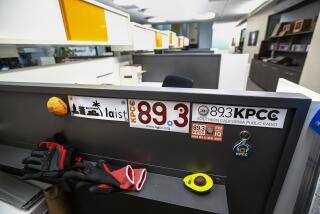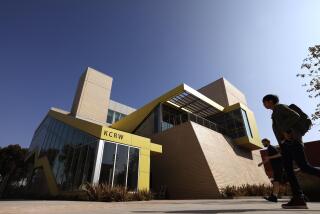KPCC Passes the Hat for New York Station
- Share via
WASHINGTON — Public radio stations usually have enough trouble raising money for themselves, without asking supporters to kick in a little extra for a station 3,000 miles away. But this is not a typical fall fund drive for WNYC--nearly taken off the air by the terrorist attacks in New York--and listeners nationwide are helping out.
During its 10-day campaign that ends this afternoon, KPCC-FM (89.3) in Pasadena has been asking its listener-supporters if they want to add $10 to their donations, to help rebuild the WNYC transmitters, destroyed along with the World Trade Center. So far, many have--pledging $25,000 in addition to the more than $625,000 they have promised KPCC.
“For us, this was really an expression of solidarity with the people at WNYC,” said Bill Davis, president of Southern California Public Radio, the nonprofit managing KPCC. “For most of our listeners, it’s an expression of solidarity with the people of New York.”
“The way we’re talking about it on the air is, public radio is this national community,” KPCC general manager Cindy Young said. Some listeners have donated in gratitude for the Sept. 11 coverage from New York’s main public radio station, which KPCC aired, starting moments after the attack. “And there’s a more personal connection: Three of those four aircraft were headed for Los Angeles,” she added.
When the first hijacked plane slammed into the north tower of the World Trade Center, WNYC immediately lost signals from its FM and backup transmitters atop the building. The station was able to broadcast on its AM frequency, from a New Jersey transmitter, and its correspondents gave listeners around New York and the nation their first eyewitness accounts of the unfolding horrors.
“We had reporters scattered throughout downtown New York” because of the mayoral primary scheduled that day, said WNYC President and Chief Executive Laura Walker. “They immediately turned their attention on this. The voices of our reporters really filled the NPR [National Public Radio] airwaves.”
But that wall-to-wall coverage cost the station, in overtime pay and lost revenue from underwriting messages that never aired. Those expenses, plus the expected $2.5 million needed to replace and relocate the transmitters, left the station with the prospect of a $4-million deficit--equal to about one-fourth of its annual budget.
WNYC had insurance on the equipment, but only for damage, not destruction, Walker said. The station is negotiating an insurance settlement, which she expects to be “a few hundred thousand dollars.”
Bill Kling, president of Minnesota Public Radio, a subsidiary of the same nonprofit that runs Southern California Public Radio and KPCC, heard about WNYC’s plight and suggested public radio stations around the country ask for extra donations. MPR’s vice president of public affairs and marketing, Marcia Appel, said, “It’s very unusual to ask for money for another station not in your market.”
In fact, it’s against the law. But the Federal Communications Commission gave a special dispensation and waived its regulations in this case. So stations from the public radio networks in Minnesota, Oregon and Vermont participated, as did KQED in San Francisco, KCBX in San Luis Obispo, and stations in Cincinnati, Dallas, Columbus, Ohio, and elsewhere, raising more than $250,000 so far.
“I’m so touched by the outpouring from other stations. It’s going to be incredibly helpful to us,” Walker said. “It’s about the public radio community coming together. In many ways, we’re a big family, and it comes out in times like this.”
Some who opted out either weren’t having fund drives at the time or feared that pleas for WNYC would compete with their own needs. Beside public broadcasters, nonprofits nationwide have worried that the outpouring of support for charities related to the Sept. 11 attacks could lead to donor fatigue and sap their support.
“For us, it was one of those ‘shaving in the morning’ questions,” Davis said. How could KPCC officials look at themselves in the mirror, “not at least having made the effort?”
“We felt very strongly at KPCC this was repayment for a debt of gratitude for Sept. 11. We should help rebuild those transmission facilities,” he said, adding that the station is on the way to exceeding its fund-raising goal of $750,000.
Appel, who herself took some of the calls from MPR listeners, said, “I was very touched by how many said, ‘Yes, I’ll do it.’
“Sometimes it was the understanding of the importance of WNYC” that spurred the donations, she said. Other callers said, “Anything to help New York. If it helps New York, I’m in.”
Even before the attacks, WNYC faced a daunting fund-raising challenge. It’s in the process of buying its license from New York City, which formerly operated the station, and the final payment of $3.3 million is due in January. WNYC had planned to devote its fall fund drive solely to raising that money; now it needs $4 million on top of that.
Since the attacks, which occurred just blocks from the WNYC studios, the station has persisted by jury-rigging its equipment and relying on the help of other broadcasters in the city. Its FM signal is back, broadcast from a temporary antenna atop the Empire State Building, but at only 850 watts instead of the normal 7,000. Most staffers are back in their offices now, but for weeks many had to use facilities and equipment lent by the public radio stations run by Columbia University and the Board of Education, public television station WNET, Oxygen Media, Sirius Satellite Radio and others.
“Without that, we wouldn’t have been able to stay on the air,” Walker said.
The next step is to buy and install a new FM transmitter atop the Empire State Building, with the backup planned for a building in Times Square. WNYC had been paying $40,000 annually to rent its space atop the trade center’s north tower, a price set when New York City owned the station and the Port Authority owned the building, Walker said. The annual rent for the Empire State and Times Square sites will total $350,000, but “there’s no other choice at this point.”
As of Monday, WNYC listeners had pledged $3.1 million in donations, more than twice the previous record set in 1994, when the station bought its license from the city. In addition, the Ford Foundation gave an emergency $1-million grant, the Corporation for Public Broadcasting donated $250,000, and other groups gave too.
“I’m really incredibly grateful,” Walker said, but she’s not surprised. “People want to help. People want to do something. We’ll make it through, but it certainly helps to have friends like Bill Kling and KPCC and all the listeners.”
More to Read
Sign up for Essential California
The most important California stories and recommendations in your inbox every morning.
You may occasionally receive promotional content from the Los Angeles Times.










